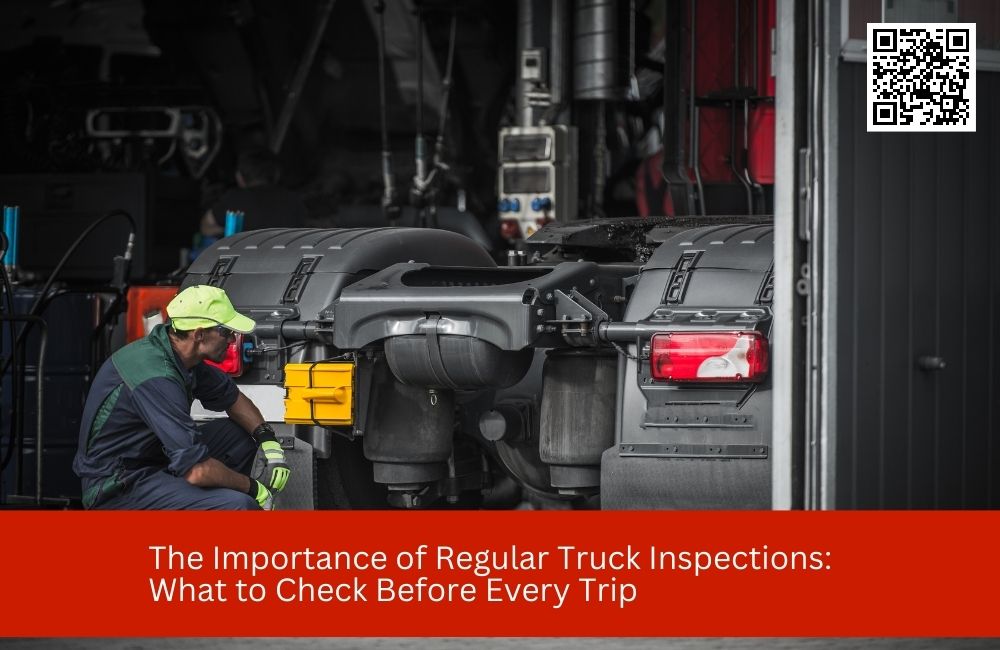Truck tires are one of the most critical components of your vehicle, directly affecting safety, performance, and fuel efficiency. Whether you’re hauling heavy loads across the country or making local deliveries, maintaining your tires in good condition is essential. However, knowing when to replace your truck’s tires can be challenging. Ignoring the warning signs of worn or damaged tires can lead to reduced handling, increased stopping distances, and even dangerous blowouts on the road. This guide outlines the key signs that indicate it’s time to replace your truck’s tires, helping you keep your vehicle safe and operational.
Key Signs It’s Time to Replace Your Truck’s Tires
- Tread Depth is Too Low
Tread depth plays a crucial role in providing traction, especially in wet or slippery conditions. Over time, the tread on your tires will naturally wear down, reducing their effectiveness. The legal minimum tread depth for truck tires is generally 4/32 of an inch for steer tires and 2/32 of an inch for other tires, but it’s advisable to replace them well before they reach this point to ensure optimal performance and safety.
- The Penny Test: One simple way to check tread depth is the penny test. Insert a penny into the tread groove with Lincoln’s head facing down. If you can see the top of Lincoln’s head, your tread is too low, and it’s time to replace your tires.
- Tread Wear Indicators: Many modern truck tires come with built-in tread wear indicators. These small raised bars run perpendicular to the tread and become visible when the tire is worn down to the minimum safe tread depth.
- Uneven Tread Wear
Uneven tread wear can indicate several issues, including improper inflation, misalignment, or suspension problems. Common patterns of uneven wear include:
- Feathering: Tread ribs are worn down on one side, typically caused by poor alignment.
- Cupping: Scalloped dips around the edge of the tire, often due to worn suspension components.
- Center Wear: Over-inflation can cause the center of the tire to wear more quickly than the edges.
If you notice uneven tread wear, it’s not only a sign that you may need new tires but also a cue to address underlying issues to prevent future problems.
- Cracks and Bulges in the Sidewall
The sidewall of your truck’s tire is crucial for maintaining structural integrity. Over time, sidewalls can develop cracks due to exposure to harsh elements, aging, or low tire pressure. Bulges or bubbles on the sidewall indicate that the tire’s internal structure has been compromised, usually by impact damage like hitting a pothole or curb.
- Sidewall Cracks: Even small cracks can expand over time, weakening the tire and increasing the risk of a blowout.
- Bulges: Bulges are a serious safety concern and require immediate replacement, as they can lead to sudden tire failure.
- Frequent Loss of Air Pressure
Tires naturally lose a small amount of air over time, but if you find yourself needing to inflate your tires more frequently, this could be a sign of a slow leak or other tire damage. Common causes include punctures from nails or screws, valve stem issues, or damage to the tire bead. While some leaks can be repaired, persistent air loss usually means it’s time for new tires.
- Check Valve Stems: Faulty valve stems can often be the culprit of slow leaks. Inspect them regularly and replace if necessary.
- Professional Inspection: A Truck Repair Shop can use advanced diagnostics to locate leaks and advise whether repair or replacement is the best option.
- Age of the Tires
Regardless of tread depth or visible wear, truck tires should generally be replaced every six to ten years. Over time, rubber degrades, losing flexibility and strength, which can lead to an increased risk of blowouts. Factors such as exposure to sunlight, temperature extremes, and usage patterns can accelerate this aging process.
- DOT Code: Check the DOT code on the tire’s sidewall to find out its manufacturing date. The last four digits indicate the week and year of production (e.g., 1218 means the 12th week of 2018).
- Regular Inspections: Even if your tires are within the age range, regular inspections by a qualified Truck Repair Shop can help determine if they are still safe to use.
The Role of Regular Inspections and Maintenance
Regular tire inspections and maintenance are essential for identifying issues early and prolonging the life of your tires. Routine checks should include monitoring tire pressure, alignment, and balancing, as well as rotating your tires to ensure even wear. Leveraging Mobile Truck Repair services can be especially convenient, as these professionals come to your location, providing timely maintenance and repairs to keep your truck running smoothly.
Menendez Roadservice LLC in Bowie, MD, offers comprehensive tire inspections and maintenance as part of their Mobile Truck Repair services. Their experienced technicians can help identify when it’s time to replace your tires and address any underlying issues that might be contributing to tire wear, ensuring your truck remains road-ready and safe.
FAQs
How often should I check my truck’s tire pressure?
You should check your truck’s tire pressure at least once a week and before any long haul. Proper inflation helps ensure optimal handling, fuel efficiency, and tire lifespan.
Can I drive on tires with uneven wear?
Driving on tires with uneven wear can affect handling, increase the risk of a blowout, and reduce traction, especially in adverse weather conditions. It’s best to address the root cause of the uneven wear and replace the tires if necessary.
What should I do if I notice a bulge in my truck’s tire sidewall?
A bulge in the sidewall indicates internal damage, and the tire should be replaced immediately. Driving on a tire with a bulge is dangerous as it can lead to a sudden blowout.
How do I know the age of my truck’s tires?
You can determine the age of your tires by checking the DOT code on the sidewall. The last four digits represent the week and year the tire was manufactured.
Is it okay to replace just one tire on my truck?
While it’s possible to replace just one tire, it’s generally recommended to replace at least two tires on the same axle to maintain balanced handling and performance. If the other tires are significantly worn, replacing all four might be the best option.
Can Mobile Truck Repair services help with tire replacement?
Yes, Mobile Truck Repair services, like those offered by Menendez Roadservice LLC, can perform on-site tire replacements, helping to minimize downtime and get you back on the road quickly.
Knowing when to replace your truck’s tires is crucial for maintaining safety, performance, and fuel efficiency on the road. By paying attention to signs like low tread depth, uneven wear, sidewall damage, frequent air loss, and tire age, you can avoid unexpected breakdowns and costly repairs. Regular inspections and maintenance, whether at a Truck Repair Shop or through Mobile Truck Repair services, play a vital role in keeping your tires in top condition. If you’re unsure about the state of your tires or need professional assistance, Menendez Roadservice LLC is ready to help with expert advice and reliable service.
For tire inspections, replacements, or other truck repair needs, contact Menendez Roadservice LLC today.
Contact Details:
Menendez Roadservice LLC – Commercial Truck Tire Service in Bowie, MD
Phone: +1 (240) 601-9664
Email: [email protected]
Address: Bowie, MD 20720
Business Hours: Monday-Friday: 7:30 am – 5:00 pm, Saturday: 8:00 am – 12:00 pm, Emergency Service Available 24/7
This provides a comprehensive guide on when to replace your truck’s tires, incorporating keywords like “Mobile Truck Repair,” “Truck Repair,” and “Truck Repair Shop” to provide valuable information to truck owners and operators. Let me know if you need further adjustments or additional content!

